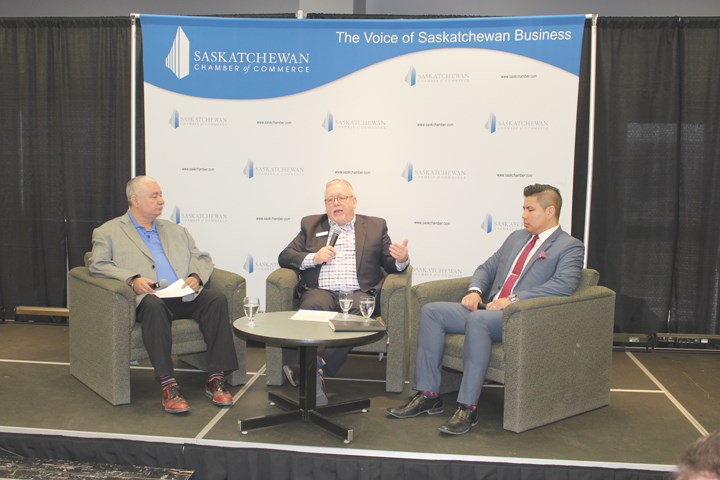There are opportunities for business to partner on future developments with First Nations people, but it has to be a partnership which is beneficial to both sides.
That was one of the messages provided by Richard Ahenakew, general manager of the Northern Lights Casino, and Thomas Benjoe, CEO and president of File Hills Qu’Appelle Developments (FHQ), as they took part in a two-person Indigenous Engagement Panel at the Saskatchewan Chamber of Commerce Conference held in Yorkton.
“We need to see benefits at the end of the day, the long term stability,” said Benjoe, adding from that they can build a capacity for further growth.
And that process takes time to create a partnership which will last.
“Partnerships are like a marriage. It takes time to understand each other… It’s not a one night stand,” said Benjoe.
And, there needs to be an understanding that First Nations employees at times will need some help because they do not have the same background.
“It’s putting the right supports in place so they can be successful,” said Benjoe, adding the organization he is with focuses a lot of attention on supporting the relationship of employee and employer.
That support process starts with making sure a perspective employee “has the right attitude for the type of work they’re going to be doing,” he said.
They also sit in on interviews “to give them that extra support,” in getting the job.
Then comes working on retention, with his organization being a liaison between the employee and employer, said Benjoe. When there is an issue, there needs to be that line of communication to address it.
Ahenakew said being able to attract First Nations people and have them fit into a business as productive employees it comes down to an investment in time and money.
The time investment is about building a supportive atmosphere for all employees.
“We help people through the tough times,” he said, pointing to his own experience at the casino in Prince Albert.
And there needs to be the support for employees to become comfortable in their jobs.
“The thing that seems to help them the most is confidence… We try to build that,” said Ahenakew.
In First Nations communities that support is often enhanced by having elders involved.
“Since day one we worked on supporting each other,” said Ahenakew, adding “number one we worked on developing leaders.”
While those leaders are supportive of employees, Ahenakew said they basically have elders on speed dial so they “are easily accessible” to provide that added help.
So do the supports in place now, and the potential for new partnerships, bode for a better future 10 years down the road?
That remains unclear.
There is reason for optimism too, he said, adding “there’s a lot more First Nations people graduating every year,” said Ahenakew.
However, that alone will not make it an easy path to better things.
“It’s tough to look forward. The past is hard to get through. The past weighs us down as First Nations People,” said Ahenakew. ”… The problem is our social issues are still going to follow us.”
Benjoe said at present there is a lot of talk around the truth and reconciliation process, adding a lot of people seem to want to jump straight to reconciliation.
That however, isn’t the best course in Benjoe’s mind.
“We need to take time to recognize the truth,” he said, adding in this area the last residential school only closed some 20-years ago, so it is still very real for many.
“It took two generations for me to be able to really break the cycle in my family,” he said, adding there were issues in the family “brought forward from residential schools.”
The truth element “starts with having that dialogue … to understand what is going on,” said Benjoe.




